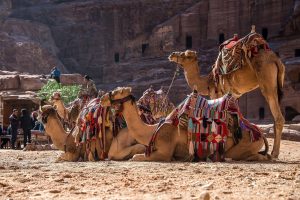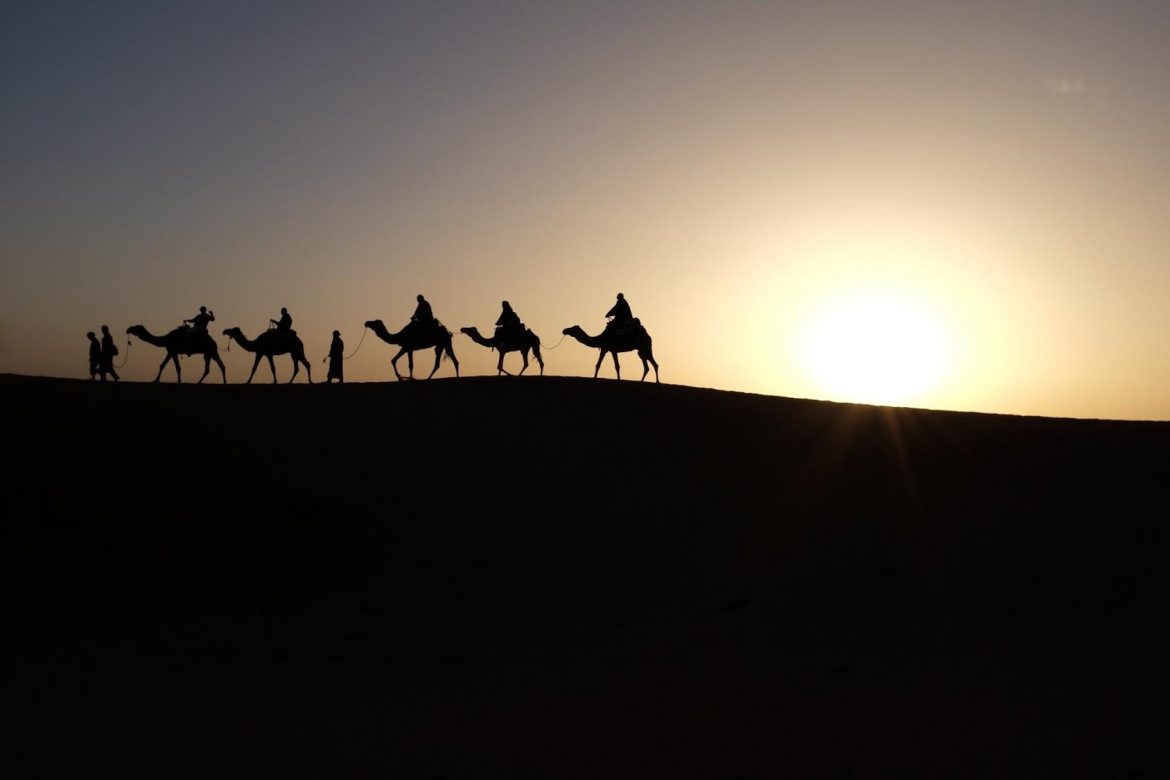By Lynn Domina —
A few years ago, I went with a group of friends to India, all of us studying interfaith dialogue. One of the few purely recreational activities was a “sunset camel ride” out into the desert near the village of Pushkar. Though I’d never heard of it before, I loved Pushkar with its mostly dirt roads filled with pedestrians, motorscooters, cows, and a few honking automobiles. I loved the market stalls filled with fabrics and vegetables and small paintings. I loved noticing how Hinduism so thoroughly infused the culture. And I was really curious about that camel ride.
 Each of our camels was led by an individual camel driver who helped us climb aboard. A camel is a lot taller than a horse, something I hadn’t thought much about before. My camel, like all the others, knelt in the sand, each leg tucked under itself. Even so, its back was still pretty high up, so my camel driver helped me swing my right leg over the saddle before I hoisted the rest of my body gracelessly up. I wasn’t too nervous yet, though my camel driver kept instructing me to “lean back, hold on tight.” When a camel stands from a kneeling position, it raises its front legs first while its back legs remain kneeling. I cannot adequately describe the queasy whoosh that wheels through your stomach when this occurs, nor the conviction that you are about to tumble, somersaulting butt-first off the camel’s behind. “Lean back, hold on tight.” Then my camel lifted its back legs, too, and all seemed almost well—until we started walking. A camel’s gait is nothing like a horse’s either, and suddenly I had to worry not only about not falling off the back end, but also about not falling off either side. By the time we reached the desert, probably only about half a mile, I felt slightly more confident, though I never stopped holding on tight. The walk back was easier, and dismounting was easiest of all. I’d been afraid almost the entire time, but I’d had fun, too, and I was grateful that I hadn’t surrendered to my fear.
Each of our camels was led by an individual camel driver who helped us climb aboard. A camel is a lot taller than a horse, something I hadn’t thought much about before. My camel, like all the others, knelt in the sand, each leg tucked under itself. Even so, its back was still pretty high up, so my camel driver helped me swing my right leg over the saddle before I hoisted the rest of my body gracelessly up. I wasn’t too nervous yet, though my camel driver kept instructing me to “lean back, hold on tight.” When a camel stands from a kneeling position, it raises its front legs first while its back legs remain kneeling. I cannot adequately describe the queasy whoosh that wheels through your stomach when this occurs, nor the conviction that you are about to tumble, somersaulting butt-first off the camel’s behind. “Lean back, hold on tight.” Then my camel lifted its back legs, too, and all seemed almost well—until we started walking. A camel’s gait is nothing like a horse’s either, and suddenly I had to worry not only about not falling off the back end, but also about not falling off either side. By the time we reached the desert, probably only about half a mile, I felt slightly more confident, though I never stopped holding on tight. The walk back was easier, and dismounting was easiest of all. I’d been afraid almost the entire time, but I’d had fun, too, and I was grateful that I hadn’t surrendered to my fear.
I remember that camel ride every year when Epiphany rolls around. I think about those wise men, those sages from the East, always pictured with their camels. They were certainly more practiced, less afraid of falling off, but surely there were moments when they needed someone to remind them to hold on tight, not to their reins so much as to their vision. Something important was happening, and they wanted to be part of it. So they rode across the desert, miles and miles, the wind blowing sand into their faces, their eyes stinging with grit. How many sunsets did it take to reach Bethlehem?
The Gospel of Matthew tells us about their arrival in Bethlehem, their encounter with Herod, their presentation of gifts to the baby, and their departure, but it tells us nothing about their journey. I understand Matthew’s choice, for his focus was on Jesus and his identity as Messiah, and he hones his focus throughout his 28 chapters. He’s not writing a big topsy-turvy muddle of a Victorian novel, heaping with characters and the rhizomic backstories of each one. He’s focused on Jesus.
My focus on Epiphany, though, is the journey. I don’t mean that the journey is more important than the destination, though that often is true. The sages’ destination of Bethlehem, where they would lay eyes on God incarnate, was undeniably important. I just mean that when I think about Epiphany, I keep thinking about what it took to get there. The trip must have been physically uncomfortable. There must have been moments when they wondered if they were still headed in the right direction, guiding star or not. One or another of them probably felt sick, at least for a day or two, for what traveler never feels sick? And wherever they looked, there was all that sand, softer than rock when they wanted to sleep but also coating their nostrils when they inhaled, their mouths when they yawned, and their food whenever they stirred it in its pot. Yet they kept on, ever westward.
That’s our challenge, to hold fast to the vision God has given us. To trust that the journey and the destination are both important. To refuse to surrender to our fear.

